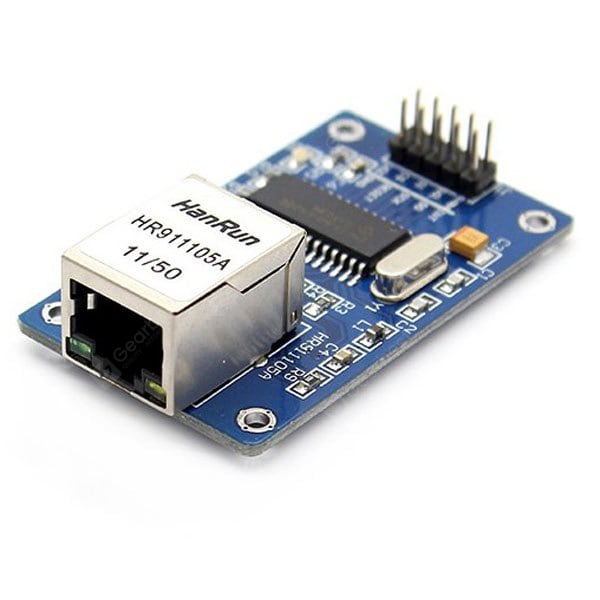Mbed library for ENC28J60 Ethernet modules. Full support for TCP/IP and UDP Server, Client and HTTP server (webserver). DHCP and DNS is included.
Dependents: mBuino_ENC28_MQTT Nucleo_Web_ENC28J60 Nucleo_Web_ENC28J60_ADC Serial_over_Ethernet ... more
Library for ENC28J60 Ethernet modules.

Ported to mbed from Norbert Truchsess's UIPEthernet library for Arduino. Thank you Norbert!
- Full support for persistent (streaming) TCP/IP and UDP connections Client and Server each, ARP, ICMP, DHCP and DNS.
- Works with both Mbed OS 2 and Mbed OS 5.
Usage:
- Import the library into your project.
- Add
#include "UipEthernet.h"tomain.cpp - Create one instance of the UipEthernet class initialized with the MAC address you'd like to use and SPI pins of the connected Mbed board.
Example programs:
Import programWebSwitch_ENC28J60
HTTP Server serving a simple webpage which enables to remotely turn a digital output on/off. Compile, download, run and type 'IP_address/secret/' (don't forget the last '/') into your web browser and hit ENTER.
Import programHTTPServer_Echo_ENC28J60
A simple HTTP server echoing received requests. Ethernet connection is over an ENC28J60 board. Usage: Type the server's IP address into you web browser and hit <ENTER>.
Import programTcpServer_ENC28J60
Simple TCP/IP Server using the UIPEthernet library for ENC28J60 Ethernet boards.
Import programTcpClient_ENC28J60
Simple TCP/IP Client using the UIPEthernet library for ENC28J60 Ethernet boards.
Import programUdpServer_ENC28J60
Simple UDP Server using the UIPEthernet library for ENC28J60 Ethernet boards.
Import programUdpClient_ENC28J60
Simple UDP Client using the UIPEthernet library for ENC28J60 Ethernet boards.
Import programMQTT_Hello_ENC28J60
MQTT Client example program. Ethernet connection is via an ENC28J60 module.
utility/os2_ip4tos.c
- Committer:
- hudakz
- Date:
- 2020-07-23
- Revision:
- 18:8d5738a6646e
- Parent:
- 16:269f652b4d0b
File content as of revision 18:8d5738a6646e:
/*
* Copyright (c) 2014-2018 ARM Limited. All rights reserved.
* SPDX-License-Identifier: Apache-2.0
* Licensed under the Apache License, Version 2.0 (the License); you may
* not use this file except in compliance with the License.
* You may obtain a copy of the License at
*
* http://www.apache.org/licenses/LICENSE-2.0
*
* Unless required by applicable law or agreed to in writing, software
* distributed under the License is distributed on an AS IS BASIS, WITHOUT
* WARRANTIES OR CONDITIONS OF ANY KIND, either express or implied.
* See the License for the specific language governing permissions and
* limitations under the License.
*/
#include "mbed_version.h"
#if MBED_MAJOR_VERSION == 2
#include <stdio.h>
#include <string.h>
#include "common_functions.h"
#include "ip4string.h"
static void ipv4_itoa(char *string, uint8_t byte);
/**
* Print binary IPv4 address to a string.
* String must contain enough room for full address, 16 bytes exact.
* \param addr IPv4 address.
* \p buffer to write string to.
*/
uint_fast8_t ip4tos(const void *ip4addr, char *p)
{
uint_fast8_t outputPos = 0;
const uint8_t *byteArray = ip4addr;
for (uint_fast8_t component = 0; component < 4; ++component) {
//Convert the byte to string
ipv4_itoa(&p[outputPos], byteArray[component]);
//Move outputPos to the end of the string
while (p[outputPos] != '\0') {
outputPos += 1;
}
//Append a dot if this is not the last digit
if (component < 3) {
p[outputPos++] = '.';
}
}
// Return length of generated string, excluding the terminating null character
return outputPos;
}
static void ipv4_itoa(char *string, uint8_t byte)
{
char *baseString = string;
//Write the digits to the buffer from the least significant to the most
// This is the incorrect order but we will swap later
do {
*string++ = '0' + byte % 10;
byte /= 10;
} while (byte);
//We put the final \0, then go back one step on the last digit for the swap
*string-- = '\0';
//We now swap the digits
while (baseString < string) {
uint8_t tmp = *string;
*string-- = *baseString;
*baseString++ = tmp;
}
}
#endif
